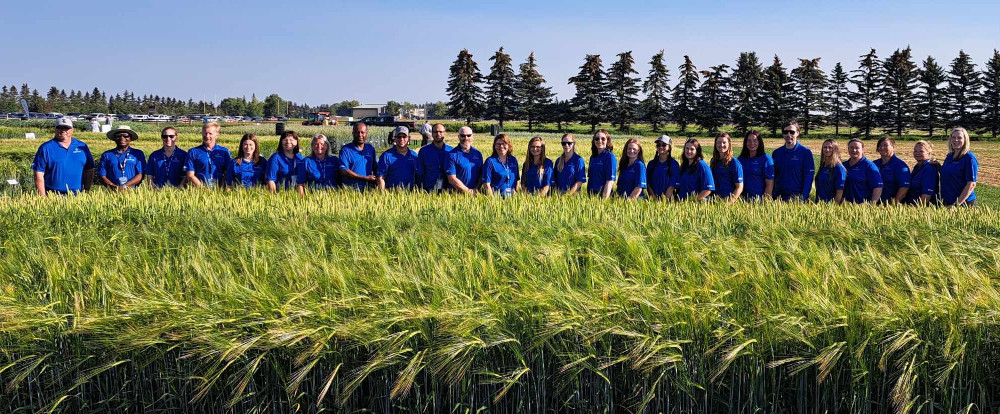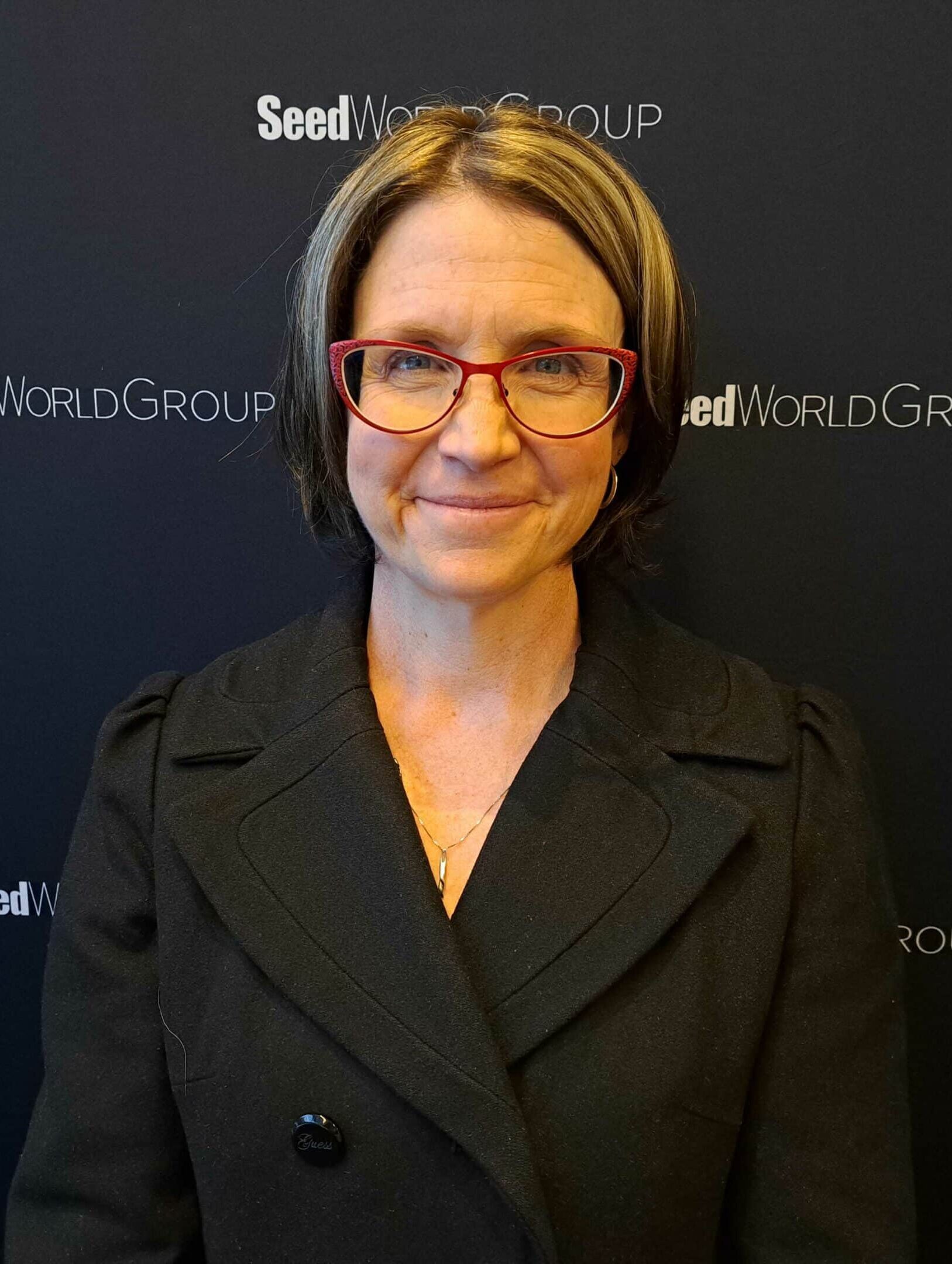PHOTO: The staff of the Field Crop Development Centre poses for a picture as last year’s AgSmart Event, where FCDC held its annual field day event. Photo: Marc Zienkiewicz
The news comes just months after the facility’s program director said stable funding was a concern for staff and stakeholders.
Last summer at AgSmart in Olds, Alta., Field Crop Development Centre (FCDC) Program Director Kofi Agblor told Seed World Canada that a stable source of funding was a concern for the facility and its staff in the months ahead, as the three years of funding it was provided after its move to Olds College was nearing its end.
Right now it’s unclear exactly what the long-term future holds for the facility and its staff, but news that broke yesterday with an announcement by Alberta’s ag minister offers a possible clue.
The Alberta government has announced the FCDC, based in Lacombe, has been relaunched as Western Crops Innovations (WCI), a non-profit corporation with an interim board.
A new structure will revitalize this organization, promote a renewed vision, and better position Alberta to meet the agriculture industry’s needs, according to Alberta’s agriculture minister R.J. Sigurdson.
“It’s an exciting time for crop research in Alberta. Western Crop Innovations will carry on the Field Crop Development Centre’s substantial legacy, ensuring its work is addressing the issues farmers are facing in the fields,” he said in a news release.
Officially starting up on April 1, WCI will carry on the FCDC’s important research, including its well-known barley breeding program, the province said. Its current programming will undergo a review, and where necessary, will be transitioned to ensure crop innovations support Alberta’s farmers’ needs now and into the future, according to the province.
The anticipated cost of WCI’s first year is $3.5 million, the province said. Government will be contributing $3.2 million, with industry support to be determined.
Long History
What is now known as WCI has had a long history, beginning in 1973 when it was established by the province as the FCDC. In 2020 it moved to Olds College, and was provided with three years worth of funding.
In 2023, the FCDC held its annual Field Day for the first time as a part of AgSmart, held at Olds College. At the time, Agblor told Seed World Canada that a stable source of funding was needed to allow the facility to continue its vision for cereal breeding in the West, specifically barley and triticale.
“Breeding involves both people and capital. It’s resource intensive and long term, and so you need that. The transition to Olds College is for three years, and is an interim plan to get into the system, get our feet wet,” he said at the time. “The next step is how we get investment to ramp up the college’s plan and deliver value to growers.”
Sheri Strydhorst of Sheri’s Ag Consulting is just one person concerned about the future of the research capacity at the facility. Historically, her primary interaction with the FCDC/WCI has been as a trial cooperator for the Alberta Regional Variety Trials (RVTs).
Staff of the FCDC have been instrumental in generating seed guide data for barley, wheat, and triticale RVTs since Strydhorst’s leadership of the RVT program began.
“As the coordinator for these trials, their contribution has been significant, comprising 8% of barley trial capacity, 6% of wheat, and 11% of triticale trial capacity. Their high-quality contributions, supported by favourable soil conditions and reliable rainfall, ensure valuable and consistent data for the RVTs,” Strydhorst says.
Their involvement constitutes 17% of silage RVT capacity as well, Strydhorst notes. Beyond her immediate needs as they concern the RVTs, the WCI plays a critical role in registration trials for barley, with implications extending across the Prairies.
“Their historical and anticipated involvement in these trials is essential for variety development and industry advancement,” Strydhorst says.
Furthermore, staff perform important analytical work on wheat protein and NIR analysis. Along with data support, the staff adds layers of quality assurance to the RVT process, according to Strydhorst.
“Their contributions provide reassurance and strengthen the integrity of the trials.”
Looking ahead, she’s hopeful that WCI staff will continue to be a cornerstone collaborator in variety development. Their partnership extends beyond trials, as demonstrated by WCI staff’s participation in industry tours and the development of notable barley varieties like AB Dram and AB Prime.
“AB Dram’s unique traits make it valuable for malting or distilling purposes, while AB Prime stands out as a high-yielding feed barley variety, showcasing its versatility and potential impact on the industry,” Strydhorst adds.
The Future
The relaunching of FCDC as WCI comes at a time when public plant breeding in Canada is going through a period of change as government funding for breeding efforts is on the decline and new partnerships are being formed to ensure public breedings programs have a healthy future.
Strydhorst — who spoke as part of an Alberta Seed Guide panel on the value of new genetics held at the CrossRoads Conference in January — says WCI boasts a team of technicians with an impressive 30 years of experience each, which is of immense value for the RVT process and beyond.
“They’re part of our RVT brain trust, the backbone of our operations. When a newcomer joins our ranks, they have to undergo extensive training to even come close to matching the expertise of these seasoned professionals. This underscores the significance of ensuring high-quality data from them,” she says.
While there may be other potential recruits, they’re often located too far from the immediate area. Moreover, the RVT process demands skill and experience that can’t be acquired overnight.
“This leaves me concerned about the future, particularly 2025 and 2026. The prospect of losing capacity and having to mentor new personnel through a process that may yield thin data for several years adds to my anxiety. Given our current data constraints, this situation leaves me feeling a bit nervous.”
The interim board, made up of representatives from government and industry, will lead WCI and the transition process. The new model will include integrated funding that connects government, industry, and post-secondary institutions, the province said in its news release.
“Considering my farm’s proximity and history with FCDC, I’m happy to help guide Western Crop Innovations to conduct research and development leading to commercialization of superior crop varieties that will benefit Alberta and western Canadian agriculture sectors,” said WCI board chair Jason Lenz.
Other interim board members are D’Arcy Hilgartner, vice-chair of Results Driven Agriculture Research; Fred Lozeman, former finance chair of Alberta Beef Producers; and John Conrad, assistant deputy minister, Agriculture and Irrigation.
Lenz, Hilgartner and Lozeman also sit on the board of Results Driven Agriculture Research (RDAR), the largest producer-guided funder of agricultural research in Alberta, according to its website.






